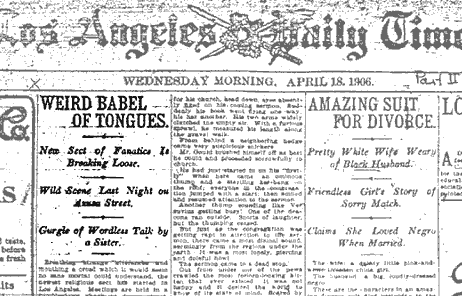Cross-posted at The Immanent Frame.—ed.
 It is a distinct honor when someone as lettered as Leon Wieseltier takes one on in public, as he does in “Dumbing Religion Down in the New York Times,” published October 24 in The New Republic. He does seem to have written this essay in one of his grumpier moods. He accused me of proselytizing for religion (or, to capture the tenor of the critique, of turning The New York Times into a Pentecostal tent revival, as one of my own readers, Jon Bialecki, pointed out). That’s not my understanding of the intent of my columns or of my work. I see myself as pointing out that an activity which makes many readers of The New York Times spit nails—or at least shake their heads in bafflement—has something to recommend it. I mostly ignore the politics because, while there is much to say about the political swing of many evangelicals, sharp writers like those who appear in The New Republic and The New York Times already say it well. But there is nothing inherently right-wing about evangelical religion and there are a lot of left-wing evangelicals to prove it. My goal, instead, is to follow the lead of one of the great founders of anthropology, Emile Durkheim, who said that we could not understand religion if we began with the premise that religion was founded on a lie. He did not mean that God was real (he was a devout atheist). He meant that if we wanted to understand why religion is so palpably important to so many people, we need not to begin with the assumption that they are idiots.
It is a distinct honor when someone as lettered as Leon Wieseltier takes one on in public, as he does in “Dumbing Religion Down in the New York Times,” published October 24 in The New Republic. He does seem to have written this essay in one of his grumpier moods. He accused me of proselytizing for religion (or, to capture the tenor of the critique, of turning The New York Times into a Pentecostal tent revival, as one of my own readers, Jon Bialecki, pointed out). That’s not my understanding of the intent of my columns or of my work. I see myself as pointing out that an activity which makes many readers of The New York Times spit nails—or at least shake their heads in bafflement—has something to recommend it. I mostly ignore the politics because, while there is much to say about the political swing of many evangelicals, sharp writers like those who appear in The New Republic and The New York Times already say it well. But there is nothing inherently right-wing about evangelical religion and there are a lot of left-wing evangelicals to prove it. My goal, instead, is to follow the lead of one of the great founders of anthropology, Emile Durkheim, who said that we could not understand religion if we began with the premise that religion was founded on a lie. He did not mean that God was real (he was a devout atheist). He meant that if we wanted to understand why religion is so palpably important to so many people, we need not to begin with the assumption that they are idiots.


